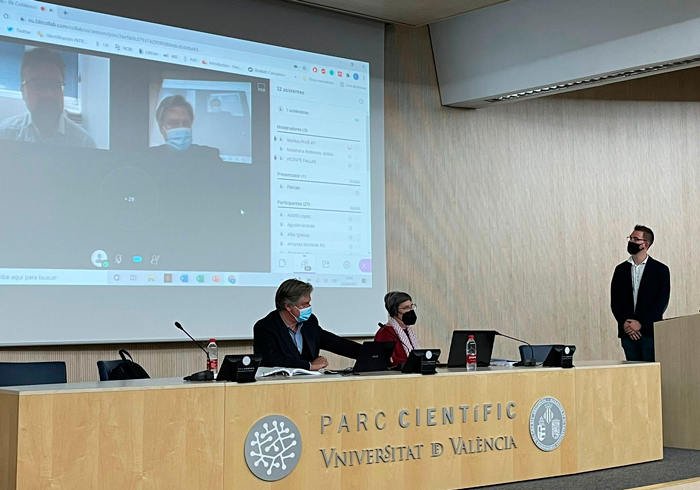Users
Social media
- More details here...
- Address
Parc Científic de la Universitat de València C/
Catedrático Agustín Escardino, 9
46980 Paterna (Valencia) Spain - Email:
iu.i2sysbio@uv.es - Phone:
(+34) 963544810
- Address
Links
Florian Mattenberger defends his thesis on an experimental study of the mechanisms of evolutionary adaptation

Investigation & Education
Thesis
Florian Mattenberger defends his thesis on an experimental study of the mechanisms of evolutionary adaptation

This doctoral thesis, directed by Beatriz Sabater and Ron Geller, and in which Mario Fares appears as director honorary, analyzes the role of duplicated genes in the phenotypic plasticity of the yeast Saccharomyces cerevisiae and that of genetic variability in the adaptive capacity of CVB3, an RNA virus. The results of the research have been published in the journals DNA research, G3: Genes, Genomes and Genetics, Environmental Microbiology, mSystems, eLife and Scientific Reports. The thesis was defended on April 22, 2021.
Living beings face changing, usually stressful, environmental conditions that test their ability to survive. The change in the genetic composition of populations lies in mutations, which are the source for evolution and adaptation to changes. This doctoral thesis, entitled “Unveiling adaptive mechanisms through experimental evolution: The role of duplicated genes and phenotypic plasticity in yeast, and the genetic variability in Coxsackievirus”, tries to address two fundamental questions in evolutionary biology. What are the molecular mechanisms that determine the stability of duplicated genes in the genome long enough for them to acquire evolutionary relevance? And, on the other hand, how does genetic variability contribute to evolution and adaptation to new environments? To try to expand knowledge regarding evolutionary mechanisms, and given that the effects of evolution in nature take a long time to be observed, biological systems that evolve quickly are needed. Therefore, in this thesis two different experimental models were used: the yeastS. cerevisiaeand coxsackievirus B3 (CVB3). With yeast, it was seen that the level of gene expression of duplicated genes, as well as transcriptional and functional divergence, are essential for the stability of duplicated genes in the genome. Furthermore, it was observed that the transcriptional plasticity of duplicated genes plays a key role in adaptation to new unfavorable environments, such as oxidative stress conditions or high concentrations of ethanol, glycerol or lactic acid. On the other hand, using the CVB3 virus, a “deep mutational scanning” approach was performed on the viral capsid proteins and virus populations with high genetic variability were generated. With these highly diverse populations, we studied how this variability contributes to adaptation against thermal inactivation. The results show that, even in RNA viruses with very high mutation rates, an increase in the genetic diversity of the population at the beginning of experimental evolution accelerates the evolutionary process and facilitates adaptation to the new environment.
Florian Mattenberger's thesis began in the laboratory of Mario Fares at the Institute of Molecular and Cellular Biology of Plants (IBMCP, UPV-CSIC) and has been completed in the Viral Biology group of the I2SysBio, under the supervision of Ron Geller (Ramón y Cajal Program Researcher) and Beatriz Sabater (CSIC Senior Scientist at the IBMCP). During the development of the thesis Florian Mattenberger has enjoyed a contract within the Research Personnel Training program (FPI) of the Ministry of Science and Innovation. The panel was made up of Emilia Matallana (I2SysBio, UV-CSIC), Markus Proft (IBV, CSIC) and Vicente Pallás (IBMCP, UPV-CSIC), who rated the thesis as outstanding.


